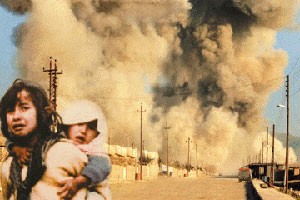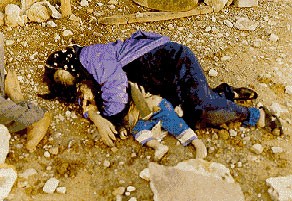-I cannot sleep at night because I am suffocating. I can’t walk for long periods of time. Physicians say it cannot be cured and it is the effect of the chemical bombing. said Parwin Mohammed (56) to journalist Ismail Osman in an article published by the ‘Institute for war and peace reporting’ recently. The Norwegian Council for the Rights of the Kurds (RKR) observes the sad anniversary this week. (14-MAR-06)
Written by Kjersti Movold, volunteer at RKR, edited for publication here by HRH / Niels Jacob Harbitz.
 On March 16th it is 18 years since Saddam Hussein’s chemical-weapon attack on the city of Halabja. The city was bombed with sarin, tabun, mustard gas and VX, as an effort in his Anfal-campaign to kill off all Kurds. Today’s residents of Halabja are still suffering from deceases inflicted upon them during the attacks. The local hospital lacks medical equipment and resources to treat the population suffering from reportorial deceases, cancers and skin – and eye deceases. The lack of treatment prolongs the suffering of the people of Halabja.
On March 16th it is 18 years since Saddam Hussein’s chemical-weapon attack on the city of Halabja. The city was bombed with sarin, tabun, mustard gas and VX, as an effort in his Anfal-campaign to kill off all Kurds. Today’s residents of Halabja are still suffering from deceases inflicted upon them during the attacks. The local hospital lacks medical equipment and resources to treat the population suffering from reportorial deceases, cancers and skin – and eye deceases. The lack of treatment prolongs the suffering of the people of Halabja.
 -All of my body was burned
-All of my body was burned
5000 people died during the morning hours of March 16th 1988. Pictures taken after the attack portray the tragic sufferings that had taken place. 10.000 people were seriously injured. ‘I was 12 years old when I was hit by the chemicals’ says Jwan Mohammad, Parwin’s 30-year-old daughter. ‘All of my body was burned and I went blind’. Jwan was sent to the United States after the attack and regained her sight. However, this is not the general story amongst the people of Halabja. Many of the critically injured have been sent abroad for medical help, but the lack of funding has made treatment impossible and many have been sent home with nothing but a new diagnosis.
 Saddam Hussein´s crimes continue to cause suffering among the Kurds
Saddam Hussein´s crimes continue to cause suffering among the Kurds
The earth and soil was also poisoned during the chemical attacks and the source of life for generations is threatened. The Iraqi government has done nothing to examine or clean the soil, which is the means to life for thousands of Kurdish people in Iraq. The crimes inflicted by the fallen dictator are continuing to cause suffering for the Kurdish people today and will continue to do so if not immediate actions taken.
Read the article by Ismail Osman
http://www.iwpr.net/?p=icr&s=f&o=260177&apc_state=henpicr
Read more about the Anfal-campaign
http://www.gendercide.org/case_anfal.html


